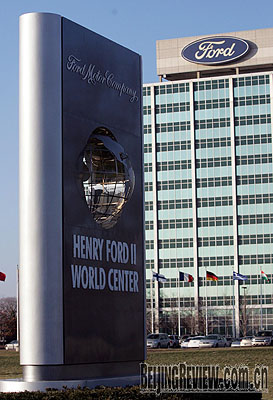|
|
 HEAVY LOSS: Headquartered in Dearborn, Michigan, Ford Motor posted a 31-percent decline in sales in November (XINHUA/REUTER)
HEAVY LOSS: Headquartered in Dearborn, Michigan, Ford Motor posted a 31-percent decline in sales in November (XINHUA/REUTER) |
While a lame duck U.S. President and Congress are busy with bills and plans to salvage the country's backbone financial institutions in this round of economic turmoil, the crisis-hit auto industry which has long served as a pillar of the national economy says it can wait no longer for a government bailout.
But when the chief executives of the Detroit-based Big Three automakers-General Motors Corp. (GM), Ford Motor Co. and Chrysler LLC-flew to Washington in their private jets to plead for a $25-billion lifeline before two congressional committees on November 19, they were turned down until they provided detailed recovery plans.
The CEOs-Richard Wagoner of GM, Alan Mulally of Ford and Robert Nardelli of Chryler-probably did not expect to fly back to Detroit empty-handed, because the stakes of letting the Big Three go under are too high.
Nearly 3 million jobs would be lost in the first year if the three automakers ceased their operations, according to a research report published by the Detroit-based Center for Automotive Research (CAR).
"Our model estimates that a complete shutdown of the Detroit Three U.S. production would have a major impact on the U.S. economy in terms of lost wages, reductions in social security receipts and personal income taxes paid, and an increase in transfer payments," said CAR Chief Economist Sean McAlinden in the report.
At a time when the U.S. unemployment rate has jumped to a 14-year high of 6.5 percent, the gloomy picture of another possible surge in the number of job losses caused by the fallout of the failed auto industry will undoubtedly add to the heavy burden of the already fragile U.S. economy.
Yet, the tough reality is that without immediate federal aid now, at least one of the automakers would have to file bankruptcy for protection in the near future. GM has announced that it is only a quarter or two away from running out of cash. The situation is not any better for the other two.
Critics and some economists have pointed out that the financial crisis is neither the only nor the major reason for the Big Three's dire situation. They have gotten too big and comfortable to adapt themselves to the changing social and economic environments, they argue.
Storied past, dim present
In 1970, GM, Ford and Chrysler accounted for 90 percent of new car sales in the United States. Today the number has dropped to roughly 40 percent, according to a Wall Street Journal article co-written by Robert W. Crandall and Clifford Winston, economists and senior fellows at the Brookings Institution in Washington.
"Detroit producers have lost market share, because they have been much less successful than their competitors in bringing out new vehicles with the basic attributes-price, size, power, operating cost, and the like-that consumers want," said Crandall and Winston.
In addition to the decline in competitiveness, the "incredibly generous" wages and benefits that the U.S. automakers have been providing for employees and their families and retirees also have contributed to the industry's financial predicament, said Michael Cusumano, professor of Management and Engineering Systems at the Massachusetts Institute of Technology.
"Today, their overall costs as well as product portfolios render them noncompetitive in international competition," Cusumano wrote in an e-mail.
Neither Cusumano nor Winston favors a bailout, which they said would not revive the auto industry beset with its own long-term problems. Both emphasized the need for the auto companies to restructure themselves to enhance their competitiveness, but they offered different suggestions on how they should do this.
Cusumano said the automakers should file for Chapter 11 bankruptcy protection under the U.S. courts and reorganize. In this scenario, the government would have to provide the financing that the auto companies would need during the reorganization period and also could "create a program to guarantee the warrantees and continued support of their products," he said.
"This is a better way to spend money on the automakers," Cusumano said. "Just giving them billions of dollars now postpones the inevitable."
There is growing support among the ordinary citizens and industry experts to let the companies file for bankruptcy and then restructure themselves, including reducing their sizes and abandoning old labor contracts.
But Winston and Crandall said in their article that instead of a direct government bailout or the alternative of bankruptcy, "the most constructive" action for the government at this point would be to "provide the automakers with a short-term infusion of capital under the condition that each of the three companies restructures its operations in anticipation of major asset sales to producers with a proven track record." But they added that a temporary infusion of liquidity or even reorganization through bankruptcy would not cure the product-line problems of the three automakers.
"Our focus is on the auto companies selling assets to more efficient companies," Winston told Beijing Review. Potential buyers of these assets, according to Winston and Crandall, include Toyota Motor Corp., Volkswagen AG, Honda Motor Co., Nissan Motor Co. or U.S. companies in related sectors.
"That will not necessarily create a large loss in jobs," Winston said.
(Reporting from New York)
| 